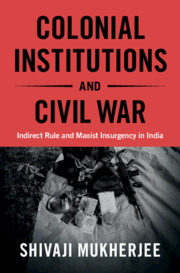Book contents
- Colonial Institutions and Civil War
- Cambridge Studies in Contentious Politics
- Colonial Institutions and Civil War
- Copyright page
- Contents
- Figures
- Tables
- Acknowledgments
- Part I Theory
- Part II Qualitative and Quantitative Testing
- 4 Qualitative Analysis of Maoist Strategy and Rebel Agency
- 5 Quantitative Testing of Effects of British Indirect Rule on Maoist Insurgency
- 6 Colonial Choice or Random Contingency? Addressing Selection Bias in British Indirect Rule
- 7 Maoist Insurgency in Chhattisgarh: The Raja of Bastar and Tribal Rebellion
- 8 Maoist Insurgency in Andhra Pradesh: The Nizam’s Shadow on Telangana
- Part III Generalizability
- Bibliography
- Index
- Series page
6 - Colonial Choice or Random Contingency? Addressing Selection Bias in British Indirect Rule
from Part II - Qualitative and Quantitative Testing
Published online by Cambridge University Press: 15 May 2021
- Colonial Institutions and Civil War
- Cambridge Studies in Contentious Politics
- Colonial Institutions and Civil War
- Copyright page
- Contents
- Figures
- Tables
- Acknowledgments
- Part I Theory
- Part II Qualitative and Quantitative Testing
- 4 Qualitative Analysis of Maoist Strategy and Rebel Agency
- 5 Quantitative Testing of Effects of British Indirect Rule on Maoist Insurgency
- 6 Colonial Choice or Random Contingency? Addressing Selection Bias in British Indirect Rule
- 7 Maoist Insurgency in Chhattisgarh: The Raja of Bastar and Tribal Rebellion
- 8 Maoist Insurgency in Andhra Pradesh: The Nizam’s Shadow on Telangana
- Part III Generalizability
- Bibliography
- Index
- Series page
Summary
In this chapter, I address the issue of selection bias more directly. First, I present a comparative case study using most-similar research design between the two similar princely states of Awadh and Hyderabad, which shows that historical contingency determined by external geo-political circumstances prevented British from being selective and led to direct rule in Awadh vs. indirect rule in Hyderabad. Second, I develop a new instrument for the British choice of indirect rule through princely states based on the exogenous effect of major European Great Power wars that decreased the ability of the British to fight wars of annexation to bring additional territory into direct rule and increased their tendency to sign treaties of indirect rule with Indian states on the frontiers of British direct rule. The instrumental variable (IV-2SLS) analysis is a major empirical contribution and allows an estimate of the causal effects of colonial indirect rule on Maoist insurgency. I also develop a fine-grained typology of different types of princely states and show that warrior states like Mysore had higher development, while successor states like Hyderabad and feudatory states like Bastar had more inequality and less development and thus Maoist insurgency.
Keywords
- Type
- Chapter
- Information
- Colonial Institutions and Civil WarIndirect Rule and Maoist Insurgency in India, pp. 136 - 183Publisher: Cambridge University PressPrint publication year: 2021



